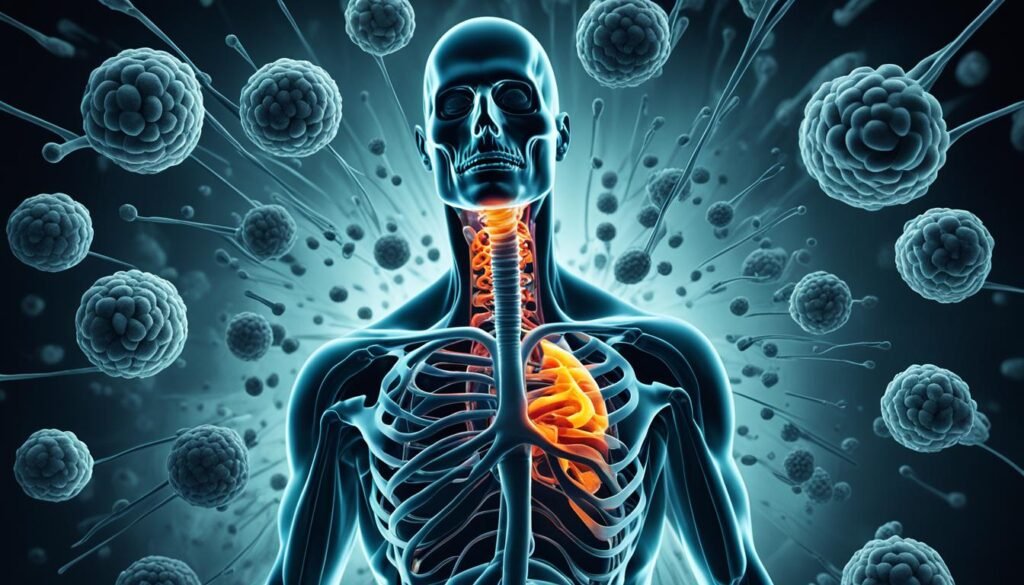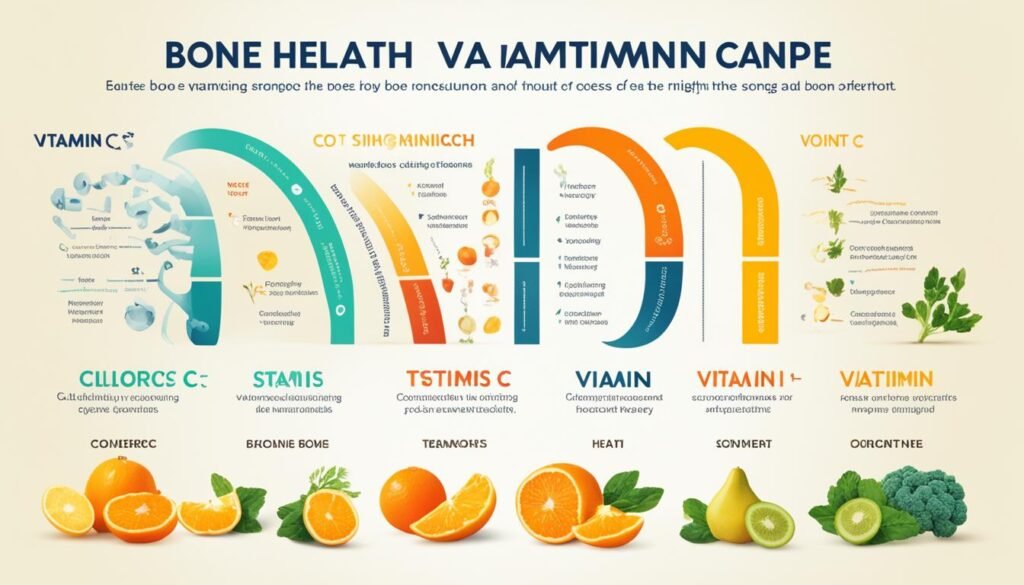Welcome to our comprehensive guide on vitamin toxicity, its risky side effects, and effective ways to manage your health without over-supplementation. While vitamins are essential for overall well-being, excessive intake can lead to adverse effects on your body. It is crucial to have a clear understanding of vitamin toxicity, its causes, symptoms, and when to seek medical help.
Causes of Vitamin Toxicity
Vitamin toxicity can occur as a result of various factors, including the misuse of vitamin supplements, certain medications, drug interactions, and an imbalanced diet. It is crucial to understand these causes to prevent the risks associated with vitamin toxicity.
The misuse of supplements is a common cause of vitamin toxicity. Some individuals may believe that taking higher doses of vitamins will enhance their health or compensate for dietary deficiencies. However, exceeding the recommended dosage can lead to harmful effects. It is essential to follow the guidelines provided on supplement labels and consult with a healthcare professional if unsure.
Certain medications can also contribute to vitamin toxicity. Certain drugs, such as those used to treat acne or seizures, may contain high levels of vitamins or interact with vitamin absorption, increasing the risk of toxicity. It is important to inform your healthcare provider about any medication you are taking to assess potential interactions or risks.
Drug interactions can further exacerbate the risk of vitamin toxicity. Some medications can interfere with the body’s ability to properly absorb or metabolize certain vitamins, leading to imbalances and potential toxicity. It is crucial to communicate openly with your healthcare provider about all the medications you are taking to minimize these risks.
Lastly, an imbalanced diet can contribute to vitamin toxicity. Consuming excessive amounts of foods rich in specific vitamins, such as liver (high in vitamin A) or citrus fruits (high in vitamin C), can lead to an accumulation of vitamins and potential toxicity. A varied and balanced diet is key to ensuring you receive essential nutrients without exceeding safe levels.
By understanding the causes of vitamin toxicity and taking necessary precautions, it is possible to avoid the risks associated with excessive vitamin intake. Consulting with healthcare professionals, following recommended dosages, and maintaining a balanced diet will help manage health effectively.
Fat-Soluble versus Water-Soluble Vitamins
Vitamins are essential nutrients that play a vital role in maintaining overall health and well-being. They can be classified into two main categories: fat-soluble vitamins and water-soluble vitamins.
“Understanding the differences between fat-soluble and water-soluble vitamins is crucial for managing your health effectively.”
Fat-Soluble Vitamins
Fat-soluble vitamins, including vitamins A, D, E, and K, have the unique characteristic of being soluble in dietary fats and are stored in the body’s fatty tissues and liver. This means that they can be stored for longer periods and don’t need to be consumed daily.
“However, it’s important to note that excessive intake of fat-soluble vitamins can pose a higher risk of toxicity.”
When fat-soluble vitamins are consumed in excessive amounts, they can accumulate in the body, potentially leading to toxicity. This is because these vitamins are not easily excreted but stored in the liver and fatty tissues. Therefore, it is essential to be cautious when taking fat-soluble vitamin supplements and follow the recommended dosages.
Water-Soluble Vitamins
On the other hand, water-soluble vitamins, including vitamins B-complex and vitamin C, are not stored in the body and are easily dissolved in water. Because they are not stored to a significant extent, these vitamins need to be consumed regularly through a balanced diet or supplements.
Unlike fat-soluble vitamins, water-soluble vitamins are more readily excreted through urine when the body’s stores are sufficient. As a result, the risk of toxicity from water-soluble vitamins is generally lower.
Both fat-soluble and water-soluble vitamins are important for maintaining optimal health. However, it is crucial to be mindful of the dosages, as excessive intake of any vitamin can lead to potential risks and adverse effects.
Next, we will explore the specific symptoms and risks associated with vitamin toxicity, providing you with valuable insights for better managing your health.
Vitamin A Toxicity and Symptoms
Vitamin A is an essential nutrient for overall health, but excessive intake can lead to vitamin A toxicity. It is important to be aware of the symptoms associated with vitamin A toxicity to identify and manage it effectively.
Vitamin A toxicity can cause various symptoms that can affect different parts of the body. One of the common symptoms is vision changes. Excessive intake of vitamin A can lead to blurred vision, difficulty seeing in low light, and even night blindness. These vision changes can significantly impact an individual’s quality of life.
In some cases, vitamin A toxicity can also result in intracranial hypertension, a condition characterized by increased pressure inside the skull. This can cause symptoms such as severe headaches, dizziness, and vomiting. If left untreated, intracranial hypertension can lead to serious neurological complications.
Another symptom of vitamin A toxicity is hair loss. Excessive amounts of vitamin A can disrupt the normal hair growth cycle, leading to hair loss or thinning. This can be distressing for individuals and impact their self-esteem.
Vitamin A toxicity can also affect the liver. Prolonged excessive intake of vitamin A can result in liver damage. The liver plays a crucial role in detoxification and metabolism, so any damage to the liver can have severe consequences on overall health.
Additionally, bone loss is a potential symptom of vitamin A toxicity. High levels of vitamin A can interfere with bone metabolism, leading to weakened bones and an increased risk of fractures. This can be particularly concerning for individuals at risk of osteoporosis or those who already have compromised bone health.
It is important to note that vitamin A toxicity is typically caused by excessive supplementation rather than dietary intake. However, it is always advisable to consult a healthcare professional before taking any vitamin A supplements, especially if you are already receiving vitamin A through your diet.
“Excessive intake of vitamin A can cause vision changes, intracranial hypertension, hair loss, liver damage, and bone loss. It is crucial to be aware of these symptoms and seek appropriate medical attention.”
Recognizing the symptoms of vitamin A toxicity is vital in managing and preventing its adverse effects. If you experience any of the aforementioned symptoms or suspect you may have vitamin A toxicity, it is essential to seek medical advice for proper diagnosis and treatment.

Vitamin B Complex and Minimal Risk of Toxicity
B vitamins are a group of essential nutrients that play a vital role in maintaining overall well-being. They are involved in various metabolic processes, promote skin health, hair health, and support overall bodily functions. One of the key advantages of B vitamins is their minimal risk of toxicity, making them a safe choice for maintaining optimal health.
The B vitamin complex consists of several individual vitamins, including B1 (thiamine), B2 (riboflavin), B3 (niacin), B5 (pantothenic acid), B6 (pyridoxine), B7 (biotin), B9 (folic acid), and B12 (cobalamin).
These vitamins play crucial roles in energy production, nervous system function, and red blood cell formation. They also contribute to the health and maintenance of the skin, hair, and nails.
When consumed in recommended amounts, B vitamins pose minimal risk of toxicity. Unlike fat-soluble vitamins, such as vitamins A, D, E, and K, which can accumulate in the body and increase the risk of toxicity, B vitamins are water-soluble. This means that any excess B vitamins are excreted through urine, reducing the risk of toxicity.
It’s important to note that while most B vitamins have minimal risk of toxicity, some exceptions exist. Niacin (B3), for example, can cause certain side effects like flushing and gastrointestinal issues when taken in high doses. However, when consumed within recommended guidelines, B vitamins offer numerous health benefits without significant risks.
To ensure optimal intake of B vitamins, it is recommended to consume a balanced diet that includes food sources rich in B vitamins. Some examples of B vitamin-rich foods include lean meats, fish, whole grains, legumes, dairy products, and leafy green vegetables.
“The B vitamin complex is a group of essential nutrients that support overall well-being and various bodily functions. Unlike fat-soluble vitamins, B vitamins pose minimal risk of toxicity when consumed within recommended limits.”
Taking a high-quality vitamin B complex supplement can also be beneficial, especially for those who may have dietary restrictions or specific health conditions that require additional B vitamin support. As always, it is important to consult with a healthcare professional before starting any new dietary supplements or making significant changes to your diet.
Vitamin C and Vitamin D
Vitamin C and vitamin D play crucial roles in supporting overall health and well-being.
Vitamin C, also known as ascorbic acid, is an essential nutrient that acts as a powerful antioxidant in the body. Antioxidants help protect cells from damage caused by harmful molecules called free radicals. Additionally, vitamin C supports the immune system, helping it function optimally. Including vitamin C-rich foods, such as citrus fruits, berries, and leafy greens, in your diet can help maintain adequate levels of this vital nutrient.
Similarly, vitamin D is an important nutrient that plays a key role in maintaining healthy bones and teeth. It aids in the absorption of calcium from the diet, which is essential for bone health. Additionally, vitamin D contributes to immune function and may support overall immune health.

While both vitamin C and vitamin D offer numerous health benefits, it is important to consume them in moderation. Excessive doses of these vitamins can have adverse effects and may lead to imbalances in the body. It is recommended to consult with a healthcare professional to determine the appropriate intake of vitamin C and vitamin D based on individual needs and health status. Ensuring a balanced diet and incorporating a variety of nutrient-rich foods can contribute to optimal levels of these essential vitamins.
Symptoms and Risks of Vitamin Toxicity
Vitamin toxicity can impact various body systems and lead to a range of symptoms. It is essential to be aware of these symptoms and understand the risks associated with vitamin toxicity.
Excessive consumption of vitamins can result in symptoms such as nausea, vomiting, dizziness, and skin changes. These symptoms can vary depending on the specific vitamin and the individual’s overall health.
In severe cases, vitamin toxicity can pose serious risks to health, requiring immediate medical intervention. It is crucial to recognize the signs of vitamin toxicity and seek medical help if necessary.
Vitamin poisoning can affect various body systems, including the gastrointestinal system, circulatory system, nerve system, and skin. Prolonged exposure to excessive levels of certain vitamins can also lead to renal and hepatic damage.
Awareness of the symptoms and risks associated with vitamin toxicity can help individuals make informed decisions about their health and avoid potential harms.

Preventing Vitamin Toxicity
“It is important to maintain a balanced diet and consult healthcare professionals before starting any new vitamin supplements to prevent the risk of vitamin toxicity.” – Dr. Sarah Johnson
Prevention plays a crucial role in managing vitamin toxicity. Following recommended dietary guidelines and maintaining a balanced diet can help ensure adequate vitamin intake without the risk of over-supplementation.
Additionally, it is essential to consult healthcare professionals, such as registered dietitians or physicians, before starting any new vitamin supplements. They can provide personalized advice based on individual needs, current health conditions, and potential interactions with medications.
By being mindful of vitamin intake and seeking professional guidance, individuals can effectively manage their health and minimize the risks of vitamin toxicity.
Conclusion
Vitamin toxicity can pose significant risks to our health when excessive amounts of vitamins are consumed. It’s crucial to prioritize prevention and raise awareness about this potential issue. By using supplements appropriately, following recommended dosages, and being conscious of potential interactions, we can minimize the chances of experiencing vitamin toxicity.
Understanding the symptoms and risks associated with vitamin toxicity is vital for making informed decisions about our health. Nausea, vomiting, dizziness, and skin changes may indicate vitamin toxicity affecting various body systems. In severe cases, medical intervention may be necessary.
Being proactive and responsible in managing our health is key. By practicing moderation, avoiding over-supplementation, and seeking professional advice when needed, we can prevent vitamin toxicity and promote overall wellness. Awareness serves as a powerful tool in maintaining a balanced approach to vitamin supplementation and safeguarding our well-being.

Thank you for your sharing. I am worried that I lack creative ideas. It is your article that makes me full of hope. Thank you. But, I have a question, can you help me?